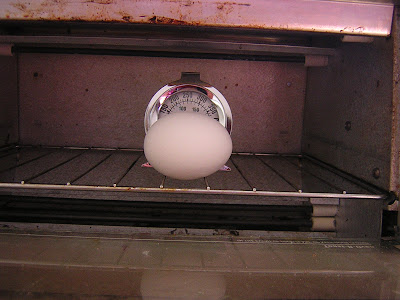Earlier I wrote about baking eggs instead of boiling. "No water," I said. "Perfect consistency is within your reach!" I tried to exploit this technique to make an egg that had firm whites and a runny yolk, and then realized I had read the original article incorrectly. While the egg white protein Ovotransferrin denatures at 142 degrees Fahrenheit and the yolk at 158F, the majority of the egg white, Ovalbumin, doesn't coagulate until 184F.

I realized my mistake when I tried to bake eggs again, first in my oven, then my toaster oven. I discovered my secondhand appliances cannot maintain a constant low temperature. How can I become an egg connoisseur with such poor oven resolution? I wanted to be like Hervé This in the Discovery article, "Ah, a 152 degree egg." I ran my first trial with two eggs: I set the oven to 160F. When I returned 30 minutes later, my oven thermometer was at 200F. Rubbery eggs. In my toaster oven, I left an egg for 15 minutes with the oven temperature at 140F and the thermometer reading 150F. The white was uncooked and the yolk had coagulated: obviously not enough time.

Finally, I set the toaster oven on at 150F and watched it diligently. The thermometer showed a temperature of 160F. I left a single egg in the oven for one hour. I unpeeled it. It was cooked, not rubbery, and quite good. But I will not bake any eggs until Easter. If you want runny yolks, frying or poaching is easier, and you don't have to peel.

You could follow the suggestion of Hervé This: "But if the oven in your kitchen is not accurate, cook eggs in plenty of water, using a good thermometer." But then, we're back to using water.
1 comment:
Yet another option would be to put the egg in a pot water which is at the desired temperature of the final egg. Then you put the whole pot in your oven. This is an easy way of keeping the water at a relatively constant temperature.
Further info on eggs here:
http://khymos.org/eggs.php
Post a Comment